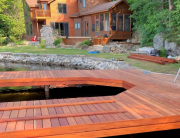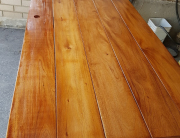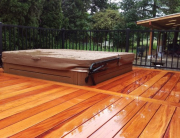Ipe hardwood | Think Twice Before Buying
The tract of the Amazon forest in Brazil is home to more than 24 million people. Many of these people belong to indigenous tribe which have been living there for generations. The forest plays an important role in their life, providing shelter, food and medicines. It is also a part of their spiritual life. A quarter of all known freshwater and land species are also found in the Amazon forest.
The Amazon forest supports an astonishing 40,000 species of plants, 427 species of mammals, 1294 species of birds, 378 species of reptile, 426 species of amphibians and more than 3000 species of fish.
More than 63 percent of the basin is inside Brazil. Far from being grateful for the wonderful bounty that nature has blessed them with and undertaking sustainable development, the government and the people of Brazil are mute spectators to a large scale environmental genocide. More than 700,000 square km of the Amazon basin, twice as big as Poland has been stripped of vegetation. In the last three decades itself, 18 percent of the Amazon forest in Brazil has been destroyed. One of the victims of this tragedy is Ipe hardwood.
What is Ipe hardwood and why is it in demand?
Ipe hardwood, also called Brazilian hardwood or Brazilian walnut, belongs to the Lauraceae family. The other popular members of this family are Avocado, camphor laurel, bay laurel and cinnamon. The tree is a commercial species and is used in making expensive furniture. The wood is sweet smelling with traces of cinnamon and nutmeg. Ipe hardwood is long lasting (the processed wood can bare outdoor conditions for more than 25 years), it is weather, mold resistant and the surface is able to resist scratches very well.
Ipe hardwood is found in Southern Brazil, Argentina and Paraguay. The Amazon region is the world’s biggest supplier of Ipe hardwood, where the tree has been systematically exploited for lumber, causing large scale deforestation and destruction of the environment. Greenpeace has covered the plunder extensively and made the world aware of the conditions under which the plant is being exploited in the Amazons.
How much do you know about the Ipe hardwood that you are using?
A two year Greenpeace investigation into the felling of Ipe hardwood in the Amazons revealed that all is not well in paradise. Ipe hardwood logging has become out of control and it is often predatory. Brazil’s timber sector is weakly governed which has given criminal elements an opportunity to plunder Ipe hardwood with impunity. The situation has come to such a pass that criminals are laundering illegal timber by showing it as legal with the aid of falsified documents.
Para state is the largest producer or Ipe hardwood in south America but you would be horrified to know that 78 percent of the wood harvested here is illegal. Daniel Brindis, reporting for Greenpeace from Para state found the situation grisly when he visited there. He saw hundreds of trucks racing on dirt tracks into the virgin forest to log the trees which would then be sent to timber yards for processing. After speaking to the locals, he found that criminals were logging, buying and selling timber without a care and the state was doing little to stop them.
Predatory logging has a number of far reaching effects
Consumed by greed, loggers have little, if no concern, for the environment. When they have devastated an area of the forest and emptied it of the Ipe tree, there is nothing to stop from entering remote areas or virgin forests.
Some of these areas are protected biological reserves and home to many indigenous tribes. Predatory logging is extremely dangerous because it threatens the existence of people dependent on the forest for their livelihood. Rare animals like Jaguars are also threatened. Moreover, logging releases large amounts of carbon dioxide into the atmosphere and causes climate pollution.
Forests are carbon sinks and they trap carbon dioxide while would otherwise have a free reign in the atmosphere. Deforestation also causes forest degradation.
Ipe hardwood is a special target of the loggers because it is very valuable and takes a long time to reach maturity. It is quite rare and very sensitive considering the conditions where it will grow. A recent study by Elsevier, found that if the logging is not stopped, the tree may become extinct.
Techniques that logging contractors use to do illegal trade in Ipe hardwood
The loggers are using a variety of ingenious methods to carry on their nefarious trade. The fraud envelops the entire supply chain, right from the logging process to the final processing.
The common methods used by the criminals are overestimation of the number of tree species in the forests, falsifying information in documents, getting permits for areas which have already been emptied of trees and to use the permit to legitimize timber logged illegally. It is easy to generate official documents through fraudulent means which are later used for illegal logging. Government officials are also hand in glove with the criminal elements who give the officials a portion of their ‘take’. The situation can be compared to a teenager who uses his elder brothers ID card to obtain alcohol illegally.
Consumers in the United States are being implicated in the fraud
United States consumers who import lumber logged in the Amazon are also responsible for this state of affairs. Let us see the case of one such company, Lumber Liquidators.
Pampa Exportacoes, which supplies timber to Lumber Liquidators was recently fined $1 million for degrading the environment. Pampa Exportacoes is just one supplier, there are many others who are doing the same thing. It is clear that Lumber Liquidators is importing lumber sourced from illegal logging. Interestingly, the company is also being investigated for illegally importing lumber through Chinese suppliers, violating the Lacey Act.
People want the end product, they are not interested in the conditions under which the product is created. According to Change for Animals, just to create one full length fur coat, nearly 65 mink, 60 rabbits, 40 foxes or 15 lynx have to be killed. It is the same for Ipe hardwood products. To produce that exquisite wood veneer in your home, who knows how many virgin forests were destroyed, how many trees were cut and how many indigenous people were displaced from their homelands. Now that you know how the wood may have been procured, please do not turn a blind eye to it.
What can you do to stop this tragedy?
There is an urgent need to bring this depredation under control. Time is running out because the temperature of the globe is rising steadily and it could affect climate everywhere. Here is what we can do to negate this menace.
- Do not buy ipe hardwood or wood products sourced from the Amazon forests, unless the producer can give proof that the wood was procured legally.
- Classify Amazon timber as a high risk product and be careful when you are dealing with suppliers or producers who sell it (check if they have complied with regulations or legislation).
- Implement a strong procurement policy and make sure that you purchase timber only from legal sources.
One alternative is to buy plantation grown timber. These are sustainable and proven options. This way you will not be supporting the exploitation and trade of virgin forest products.
Resources




